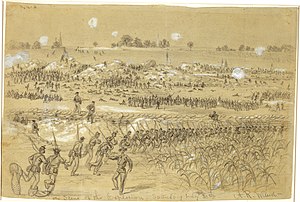Battle of the Crater
| Battle of the Crater | |||||||
|---|---|---|---|---|---|---|---|
| Part of the American Civil War | |||||||
 Scene of the explosion Saturday July 30th Alfred R. Waud, artist. |
|||||||
|
|||||||
| Belligerents | |||||||
|
|
|
||||||
| Commanders and leaders | |||||||
|
Ambrose E. Burnside James Ledlie |
Robert E. Lee William Mahone |
||||||
| Units involved | |||||||
| IX Corps | Elements of the Army of Northern Virginia | ||||||
| Strength | |||||||
| 8,500 | 6,100 | ||||||
| Casualties and losses | |||||||
|
3,798 total 504 killed 1,881 wounded 1,413 missing or captured |
1,491 361 killed 727 wounded 403 missing or captured |
||||||
The Battle of the Crater was a battle of the American Civil War, part of the Siege of Petersburg. It took place on July 30, 1864, between the Confederate Army of Northern Virginia, commanded by General Robert E. Lee and the Union Army of the Potomac, commanded by Maj. Gen. George G. Meade (under the direct supervision of the general-in-chief, Lt. Gen. Ulysses S. Grant).
After weeks of preparation, on July 30, Union forces exploded a mine in Maj. Gen. Ambrose E. Burnside's IX Corps sector, blowing a gap in the Confederate defenses of Petersburg, Virginia. From this propitious beginning, everything deteriorated rapidly for the Union attackers. Unit after unit charged into and around the crater, where soldiers milled in confusion. Grant considered the assault "the saddest affair I have witnessed in the war." The Confederates quickly recovered and launched several counterattacks led by Brig. Gen. William Mahone. The breach was sealed off, and Union forces were repulsed with severe casualties. Brig. Gen. Edward Ferrero's division of black soldiers were badly mauled. This may have been Grant's best chance to end the Siege of Petersburg. Instead, the soldiers settled in for another eight months of trench warfare. Burnside was relieved of command for the last time for his role in the debacle, and he was never again returned to command.
...
Wikipedia
